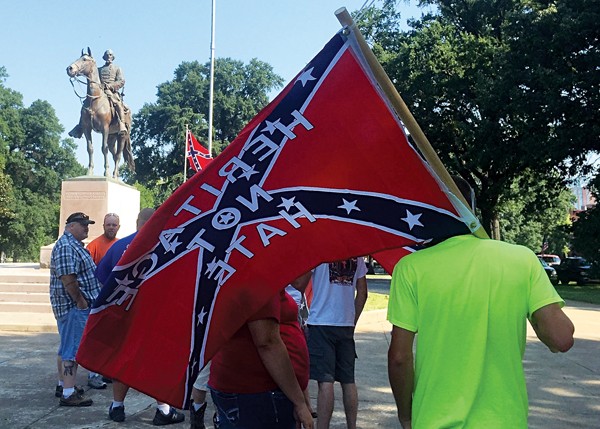The Memphis City Council voted this week to remove the statue of Nathan Bedford Forrest from Health Sciences Park, even though the next steps to make that happen remain murky.
The proposal to remove the statue surfaced in June, part of a national movement to remove Confederate symbols after a white supremacist shot nine African Americans at a church in Charleston, South Carolina.
 Toby Sells
Toby Sells
Confederate supporters at a rally on Saturday
The move also ratifies a 2013 resolution to rename Forrest Park to Health Sciences Park, Confederate Park to Memphis Park, and Jefferson Davis Park to Mississippi River Park. A separate but related proposal to move Forrest’s remains and those of his wife from the park and back to Elmwood Cemetery was approved by the council in early July.
Council chairman Myron Lowery sponsored the ordinance for the statue’s removal.
“It’s important because Memphis is not the same city it was in 1905, when the statue was put in place,” Lowery said. “It is wrong to honor a slave trader on public property in 2015.”
But Lee Millar, a leader of the local Sons of Confederate Veterans group, said Saturday he didn’t see it that way. He and about 100 others gathered around Forrest’s statue, hoisting, waving, and wearing Confederate flags, their conversations about Southern heritage and the council vote only interrupted by a bullhorn that sporadically belted out “Dixie.”
“We’ll be there Tuesday to let the council know they’re doing the wrong thing,” Millar said. “They don’t need to erase Memphis history.”
Millar said removing the statue is a “waste of time,” that it wouldn’t “solve a single problem with gangs and crime and all of that,” and that it would only “add to the division in Memphis.” Forrest was a “prominent Memphian,” Millar said, as a city council member and an executive in an insurance company and a railroad who “hired blacks and whites alike” to help “rebuild Memphis after the [Civil War].”
Allan Wade, the city council’s attorney, said last week that he was still working on a plan for the statue’s removal and would reveal the details to the council. An official in Memphis Mayor A C Wharton’s office said the city has had “several offers” for the statue, including a very public one from the mayor of Savannah, Tennessee, who told news outlets last month his city would pay for the statue and its relocation.
“But there is still a lengthy process that has to take place before the statue and graves can be removed from the public space,” said Dewanna Smith, a Wharton spokesperson. “At this point, it would be premature to respond to any offers.”
Relocating the graves will also be a lengthy process. The matter will be decided in Shelby County Chancery Court in a case between the city and Forrest’s descendants. Millar said he has located eight Forrest descendants in the area and that “every one of them is steadfastly against moving the statue or the grave.”